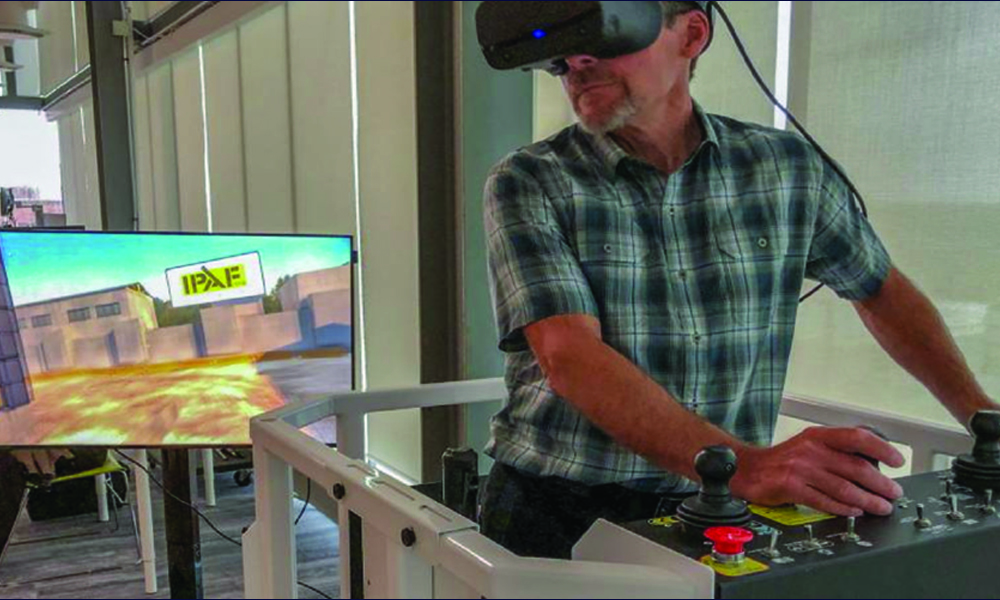Marking the first time that equipment operators may renew their license by simulator, without even touching a physical machine, the International Powered Access Federation (IPAF) has approved Serious Labs’ mobile elevating work platform (MEWP) virtual reality (VR) operator training simulator for renewals of its Powered Access License (PAL) card.
IPAF has issued more than two million PAL Cards worldwide, and its operator training is recognised in more than 51 countries, including those in the GCC region. PAL cards typically need to be renewed every five years. Serious Labs’ VR simulator offers convenience, reliability and standardisation to contractors and operators alike, said the Canadian technology company.
Jim Colvin, CEO, Serious Labs, said: “This is a major milestone for the safety and training industry. The impact of this approval by such a trusted and esteemed organisation as IPAF will make training renewals, and safety overall, more accessible and convenient. That will help save lives, increase uptime and reduce accidents. The fact that heavy equipment operators can now renew their license through simulation for the first time ever is a testament to the years of hard work by our team here at Serious Labs, as well as to the commitment to safety by the access industry as a whole.”
The simulated MEWP PAL card renewal tests existing PAL card holders through a VR-based replica of the IPAF 3a/3b practical test. Two scenarios go through a pre-use check on the machine, and a practical course, just as if the operator was on a machine in the real world. Created from the data and results of trials over the course of eight months, the course uses an abridged theory session but the same practical session, based on ISO 18878 that is used in the standard 3a and 3b courses. The trial used experienced operators with a minimum three years’ experience who each held a valid PAL card.
Darren Verschuren, international account director, Serious Labs and former safety trainer with Riwal, added: “It’s a mirror image of what you would do with the real machine, but the simulator comes to where you work, rather than you going to where the training course is being held.
“For large construction projects, or even something like a remote work location, rather than the guys having to travel to a rental depot or training centre that might be two hours from their house, they just go to work as normal. An IPAF Training Centre can bring the unit to them.”
“If you had four guys who needed to renew their PAL card, normally you would lose them for a day, plus travel. So you effectively lose four days. Whereas now, we turn up on the site, you’ll only lose them from work for about 90 minutes each. That’s a significant productivity savings for contractors. Plus, you’re not having to pay travel costs for meals and hotels, and COVID exposure risk is reduced.”
According to Serious Labs, a number of leading organisations and projects using access equipment are fully supportive of using the VR simulator for renewing PAL Cards and were actively involved in the trials.
Peter Douglas, CEO and managing director of IPAF, said: “These additions to IPAF’s training offer fully embrace the possibilities afforded by new technology. They are borne out of ingenuity and informed by the flexible ways our Training Centers learned to work to help meet continued demand for quality powered access training through the pandemic.
“I’d like to thank our dedicated team and our members, as well as their clients and customers, for working with us to develop these new options, to ensure they are fully tested and that they conform to the high standards that underpin IPAF’s training program. I am sure we will continue to receive valuable feedback that will allow us to continue tailoring and evolving IPAF training to suit changing demand in future.”
Examining the state of the industry, Colvin said he saw a major shift underway. “We are committed to continue to break through barriers – technologically, socially and culturally – to help bring the construction and rental industries into the 21st century by improving safety and human working conditions. VR simulators are simply the future of efficient, safe and proficient operator training.”
